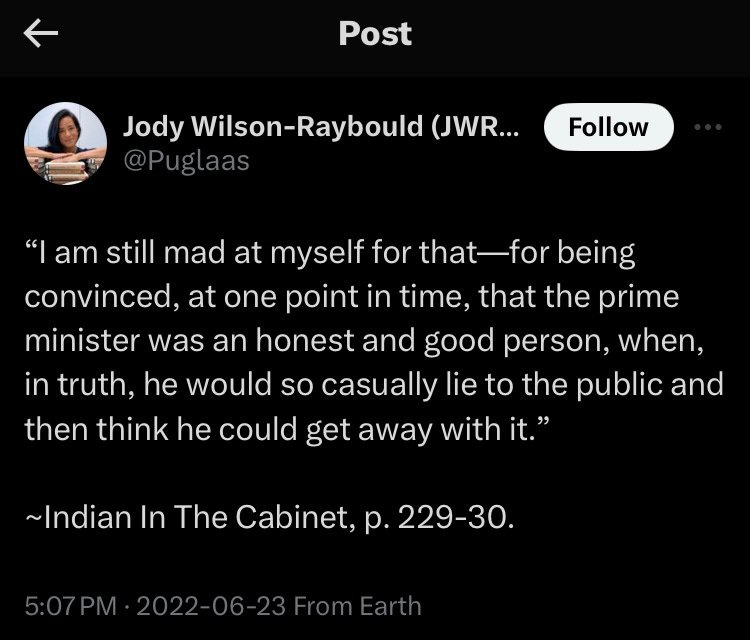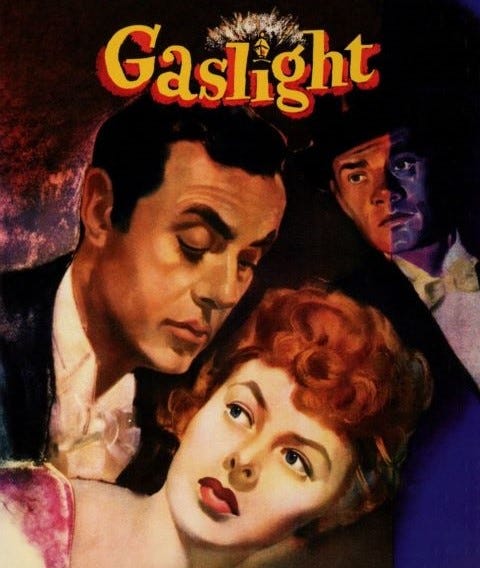What’s with all the lying these days? The mendacity emanates from the centre, it seems—from the federal cabinet and senior public servants surrounding it.
The pattern by now is familiar. Government wrong-doing comes to light. An official alleges undue political influence. The center maintains its innocence—that it knew nothing, did nothing wrong. Then the truth comes out.
To shoot one fish in this teeming barrel: in September 2023, the Prime Minister denied that his office had invited a Nazi into the Canadian Parliament. By February 2024, an access-to-information request proved that it had.
The motherlode of such denials was the SNC Lavalin affair. The Prime Minister and his advisors denied having exerted undue influence on former Attorney General Jody Wilson-Raybould. Only her clandestine recording of a phone call with the Clerk of the Privy Council confirmed the attempt to pressure her.
Almost three years later, Wilson-Raybould confessed her lingering anger over the Prime Minister’s lies—at herself for having ever believed him:
Why would a practiced politician feel angry about lies? What kinds of lies do politicians tell us anyway? Why do they tell them? Why should we resist—and how?
Four types of political deception
The twenty-first century has been tagged as a “post-truth” era, for which calibrated appeals to our emotions are the chosen political currency. In this context, I submit, political leaders use four kinds of lies. If unchecked, such lies can cast a web that obscures our shared reality and incapacitates thinking or acting on its basis.
The first type is the single lie. In his 2005 book, On Bullshit, American philosopher Harry G. Frankfurt describes telling a lie as “an act with a sharp focus.”
“It is designed to insert a particular falsehood at a specific point in a set of system of beliefs, in order to avoid the consequences of having that point occupied by the truth” (51).
Think of former American president Bill Clinton as he gazed into the camera 26 years ago. “I did not have sexual relations with that woman, Ms. Lewinsky.” Lying came naturally to him, submits UnHerd columnist Giles Fraser, “almost as if the truth-telling part of his brain were disconnected from his emotions.” Yet Clinton connected well with the emotions of others; he used counterfeit sincerity to create a bond and exploit them.
A quarter century ago, Fraser says, Clinton appeared as the “patron saint” of the post-truth era. His lies bred a lasting political cynicism in the American public—especially in Democrat voters, who knew he lied but voted for him anyway.
The single lie places a strand of deceit where the truth should be. Left unpunished, it sets a precedent, preparing us to accept further deception.
The second type is bullshit. Harry G. Frankfurt submits that bullshit is a hallmark of our culture: an expansive habit of speaking for entertainment and self-promotion, with no concern for the truth or falsity of one’s words. Bullshitting is fun, for its audience as much as the bullshitters themselves.
Political theorist Jacob T. Levy offers former President Donald Trump as a master of bullshit. He argues that Trump uses it to draw and hold a crowd, like a carnival barker at a county fair.
But bullshit comes at a price. In Frankfurt’s view, it is “a greater enemy of the truth than lies are” (61). The liar at least inserts his lie into a context he also sees as true. The bullshitter “is prepared, so far as required, to fake the context as well” (51).
Bullshit softens us up for a further, more sinister deceit.
Gaslighting, our third type of political deception, has run rampant lately—to the extent that Merriam-Webster’s Dictionary declared it Word of the Year in 2022. The number of searches for the term spiked by 1,740 percent over the prior year, though the dictionary did not inquire into possible reasons.
Gaslighting, notably, involves psychological abuse. The term arose from a play that was made into a Hollywood film in 1944. A man drove his wife to doubt her sanity by denying the evidence of her eyes and ears. Though since extended to encompass “the act or practice of grossly misleading someone, especially for a personal advantage,” the original term refers to:
psychological manipulation of a person usually over an extended period of time that causes the victim to question the validity of their own thoughts, perception of reality, or memories and typically leads to confusion, loss of confidence and self-esteem, uncertainty of one's emotional or mental stability, and a dependency on the perpetrator.
Several federal cabinet ministers have outed themselves as zealous gaslighters—evinced by the many statements that begin, “Canadians know” or “Canadians want,” followed by a deeply unpopular policy that few ever asked for.
A prominent example is the carbon tax. Almost 70 percent of Canadians recently polled were against the next hike, while a growing chorus wants the tax scrapped. In face of it, the Minister of Energy and Natural Resources issued this tweet:
The tweet presents both a veiled threat and alternative reality, in which a Liberal clawback of a Liberal rebate of a Liberal tax becomes a Conservative cut.
The media story, notably, is part of the gaslighting: a single University of Regina economist offers that most Saskatchewan residents benefit more than they pay for the carbon tax. The article makes no mention of the Statistics Canada data cited to make the opposite claim. The other side of the story is nowhere to be found.
This leads us to the fourth type of political lie.
Propaganda is a coordinated, deliberate campaign promoting an ideology and disrupting independent thought. It usually appears together with a program of censorship.
In her 1967 essay “Truth and Politics,” political philosopher Hannah Arendt calls it the “modern political lie,” a “relatively recent phenomenon of mass manipulation of fact and opinion” that is found in both democracies and totalitarian regimes (252). Entire government agencies are dedicated to creating facts and narratives to support a substitute image of reality.
Arendt offers that the producers of the propaganda also believe their own lies, creating an “out” group of those who do not accept the image it conveys:
The main effort of both the deceived group and the deceivers themselves is likely to be directed toward keeping the propaganda image intact, and this image is threatened less by the enemy and by real hostile interests than by those inside the group itself who have managed to escape its spell and insist on talking about facts or events that do not fit the image (255).
The COVID-19 response presents a stellar example of propaganda. As we now know from the Twitter Files, critics of the official COVID narrative were censored on social media. At the same time, citizens endured an onslaught of propaganda, led even by the military.
The 2022 Freedom Convoy also became the object of propaganda—for having attempted to break the spell of propaganda surrounding COVID.
The single lie. Bullshit. Gaslighting. Propaganda. The emotional appeals in our “post-truth” era have made our shared political life fraught, contested, and demoralizing. For some, they have caused us to doubt our shared reality, sweeping us into the alternative offered by propaganda.
This could well be the point. In his 2006 essay On Truth, Frankfurt observes that lies “are intended, in a very real way, to make us crazy.” Decades earlier, Arendt indicated how lying prepares us to be exploited:
If everybody always lies to you, the consequence is not that you believe the lies, but rather that nobody believes anything any longer. . . . And a people that no longer can believe anything cannot make up its mind. It is deprived not only of its capacity to act but also of its capacity to think and judge. And with such a people you can then do as you please.
The end point of rampant political deception leaves citizens uncertain of reality, unable to act within it.
And that’s no way to live.
What now?
How to escape the web of lies?
A future post will address the escape from propaganda via the appeal by dissidents to live in the truth.
The first three types return us to Puglaas, the Kwak’wala name of our former Attorney General. Her 2021 book Indian in the Cabinet makes it clear that she fielded all manner of lies, bullshit, and gaslighting in her three years in cabinet. Yet she still managed to escape with integrity—without succumbing to pressure to lie herself.
How did she do it?
For one, it appears that she gave up caring to preserve her reputation in Ottawa. In our current regime, lying kills the careers only of those who expose it. Those who lie often “fall up”—obtain a Senate appointment, or the Order of Canada, or a prestigious chair at a major university, for example. She knew she would be vilified by the Liberal caucus and media, but was prepared to withstand that censure.
A second feature of her revolt: Puglaas made effective use of her anger. Yes, she remained angry with herself, but she was also angered by the situation that others had confronted her with. Righteous indignation—anger at the right time and place, acted on in the right way—seemed to guide her, enabling her to act with integrity and impact rather than vainly lashing out.
Third, Puglaas stayed true to her principles, despite all threats and enticements—to teachings conveyed by her family, community, and experience as an Indigenous political leader. Among them? A commitment to tell the truth and hold others to that standard. She recalls reminding the prime minister that truthfulness remained an option in addressing SNC Lavalin:
“I knew the only way to deal with it was to tell the truth. Full transparency. It was as clear to me as sunlight. The prime minister had to simply acknowledge that the attempts to apply pressure were not proper and take concrete steps to address the wrong actions” (2).
Our former Attorney General, in short, was a model of how to withstand the web at the centre—a model not only for political leaders but for all of us. Her book is worth reading, for its story, as well as the alternative vision of politics it offers.
Worth observing for Canadians: Puglaas raised the alarm on the false sincerity of our prime minister at least three times—through her resignation, her testimony before a parliamentary committee, and her book published prior to the 2021 election. Yet the Liberals still won two elections. This evinces a high tolerance for lying—to the point of psychological abuse—in a significant portion of the Canadian population.
For those who value our existence as free human beings, enabling serial liars in highest political office cannot continue.
It’s time to demand that the deceit end.
Suggested Reading
Hannah Arendt, “Truth and Politics,” Between Past and Future, Penguin Publishing Group, 1968, 227-64.
Harry G. Frankfurt, On Bullshit. Princeton: Princeton University Press, 2005.
Jody Wilson-Raybould. Indian in the Cabinet: Speaking Truth to Power. Toronto: HarperCollins Publishers Ltd. 2021.









Jodi, your description of escalating political deception rings so true. That's how I experienced the propaganda, not knowing, at the time, I was already up to my eyeballs in propaganda.
First, I heard the single lie—nothing can save us from this deadly disease except a vaccine. But to register the lie as a lie, I first had to hear the truth: that this disease we've labelled COVID-19 is amenable to successful outpatient treatment, just like any other viral respiratory disease. That truth I heard from courageous Canadian physicians like Dr. Patrick Phillips and Dr. Ira Bernstein, members of the Canadian COVID Care Alliance.
Once I registered the lie, then I heard the evisceration of context: we had media talk-show hosts talking out of the sides of their mouths, having a jolly good time bullshitting and denying the utility of generic meds (like ivermectin and hydroxychloroquine, and even vitamin D) as if they were clinicians with expertise treating respiratory illnesses.
And then I experienced the onslaught of gaslighting, as did anyone who questioned the safety of rushed vaccines. Who can forget the full-frontal attacks by the mainstream media, hurling abuse at the unvaxxed, taking their cues from our public health authorities and politicians, notably our Prime Minister? It's not easy to live with such cognitive dissonance: one foot firmly grounded by the truth-telling reality of internationally respected scientists and physicians; the other foot constantly dragged back into the muck of deception by well-intentioned family and friends who hadn't yet registered the lie and bullshit.
Despite all that, it still took a while for the penny to drop and for me to understand that the propaganda and corruption we've been exposed to is far, far greater than the usual marketing ploys of Big Pharma. How is it that a genetic therapy or vaccine—known for years in the pharmaceutical industry to be commercially unviable, known to cause auto-immune disease, and known to use lipid nanoparticles toxic to humans as part of its delivery system—could be sold as "safe and effective" around the globe, endangering the health and lives of billions of people? That's one hell of a big lie.
Thank goodness for Canadian truckers and their dedication to truth-telling. And for all those brave Canadians who testified at the National Citizens Inquiry.